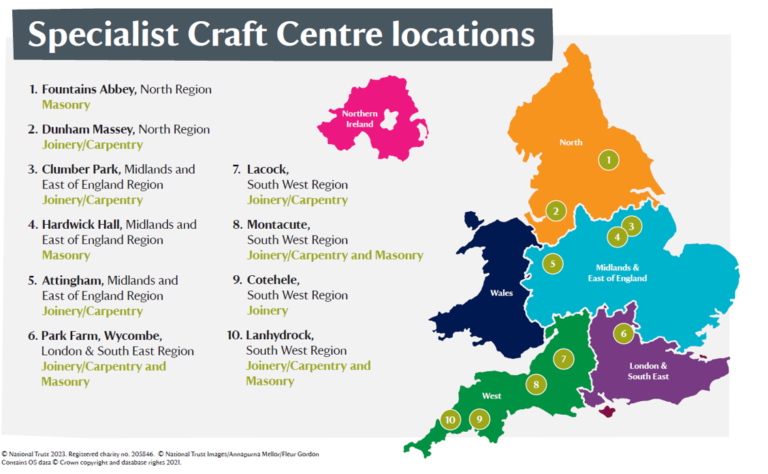As part of the Skills theme of our Sector Resilience Interview series, we heard from Fleur Gordon, Head of Skills & Crafts at the National Trust, all about the Trust’s Specialist Crafts Centres and how they are working to sustain longer-term expertise in heritage skills.
Read on to find out more.
Fleur, tell us a bit about yourself and your role in the heritage sector.
I’m the National Trust’s Head of Skills & Crafts, focussing on developing long-term self-sufficiency of professional, technical and craft skills for the Trust, as well as growing external partnerships in order to share development opportunities and foster heritage skills training.
Founded in 1895 the National Trust is the largest conservation charity in Europe and our charitable purpose remains the same – to provide nature, history and beauty for the nation. With approximately 29,000 buildings, including 500 significant country houses, castles and mansions, in our care, the Trust’s strategic ambitions include:
- ‘Looking After’ – we will care for our places and give them a sustainable future,
- ‘Growing Support’ – we will give people more opportunities to get involved and support our work,
- ‘Curation and Experiences’ – we will make sure our places keep evolving, attracting and inspiring people
- ‘People and Resources’ – we will be an inclusive, welcoming and sustainable organisation
What can you tell us about the National Trust’s Specialist Crafts Centres? What do they aim to achieve?
The Trust’s 10 Specialist Crafts Centres were established in 2022, with the Vision:
‘to create recognised centres of excellence for the provision of crafts skills across the National Trust, preserving and championing traditional skills and developing new and existing talent to provide the highest level of care for our buildings and engagement with our supporters.’
Our Specialist Crafts teams provide stonemasonry and joinery/carpentry specialisms and work regionally, supporting our more significant places. They form a national community of skilled building conservation professionals, collaborating and sharing good practice.
The Centres also support the Trust’s Heritage Skills Apprenticeship Programme, which started in 2022. We currently have 13 joinery and stonemasonry apprentices, with ambitions to host more. The apprentices are mentored by, and work with, our Specialist Crafts teams. Each apprentice will benefit from a post-apprentice year with the Trust to further embed their skills

What contribution will this make towards the resilience of the heritage sector?
- develops and supports the new talent pipeline in heritage skills
- promotes cultural heritage & demonstrates the Trust’s commitment to conservation
- raises the profile of building crafts to wider audiences, so more young people consider it as a career.
- Increases the diversity of participants by providing opportunities for hard-to-reach communities to engage with heritage skills and learn about traditional building techniques.
- encourages diverse audiences to benefit from the skills and expertise of the Specialist Crafts teams, by providing opportunities for people from under-represented backgrounds to become involved with building conservation
- using the Centres as a vehicle to deliver wider building conservation upskilling.
What does success look like for your work? How do you plan to measure this?
- Successful apprenticeship programme – mapping apprenticeships delivery against KPIs, including recruitment from diverse groups to improve young peoples’ opportunities and retention in the industry.
- Good quality engagement – involving conservation in action, training, providing CPD, outreach with young people (including schools and educational institutions and offering placements).
- Measuring outcomes via feedback from participants, growing diversity of audiences and assessing impacts on people and communities.
Where can we find out more?
We’re in the process of creating a Linkedin page for the Trust’s Specialist Crafts, but in the meantime I’m often posting about our Specialist Craft teams on Linkedin.
You can also hear from one of our apprentices, here.
Overall, what do you think is most crucial for ensuring a resilient heritage sector?
Appropriate resourcing – having people with passion, skills and expertise who, with the right capacity support, can improve lives and communities through heritage.
This Sector Resilience interview was shared by Fleur Gordon as part of our Heritage Sector Resilience Plan activities.
If you’d like to contribute an interview as part of the series, follow the link below to find out more:

